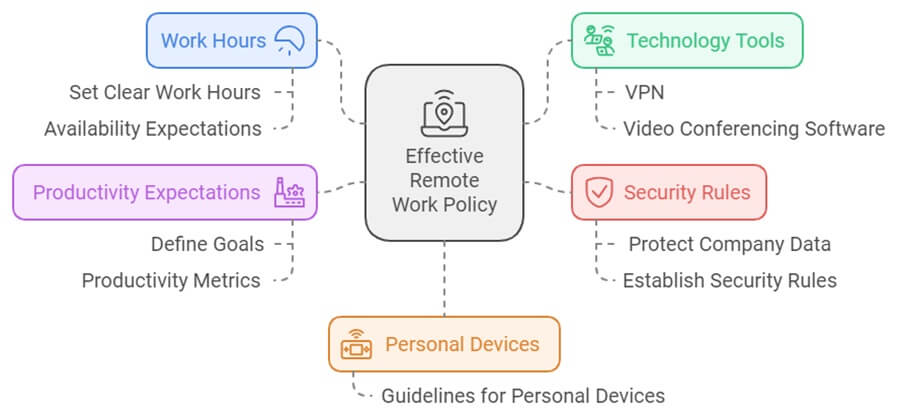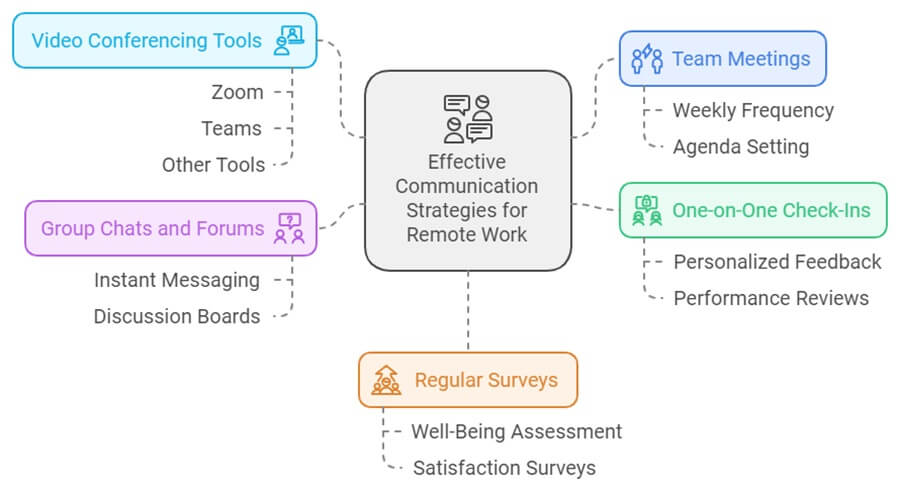Advantages of Remote Work. How does VoIP facilitate its implementation?
- Renier Schrenk

Table of contents
Telecommuting has gone from an optional benefit to an essential work mode for many companies. With the increasing adoption of hybrid and remote work systems, employees and employers are experiencing the benefits of this transformation.
In this post, we’ll explore in detail the advantages of remote work for employees, the challenges it can bring, best practices for successful implementation, and how a VoIP communication system, such as VoIPstudio, can facilitate its adoption.
What is remote work
Remote work, also known as telework or telecommuting, has gained widespread popularity after the COVID-19 pandemic. However, remote work has proven to be a lasting solution beyond being a temporary response to a crisis that offers significant advantages for both employees and employers.
By 2024, approximately 98% of employees prefer to work remotely, at least some of the time, because of the benefits related to flexibility and reduced commuting. This shift has transformed not only the way we work but also how companies manage their resources.
Advantages of Remote Work for Workers
Remote work has transformed the way many employees organize their professional and personal lives. It offers a number of benefits that have been shown to improve overall well-being and increase job satisfaction.
Here are some of the most important benefits:
Flexibility and Work-Life Balance.
One of the main advantages of telecommuting is the ability to manage schedules flexibly. Employees can tailor their workday to their needs, making it easier to balance professional and personal responsibilities.
This flexibility allows employees to structure their day more productively, adjusting to times of greater concentration and avoiding the rigidity of a fixed schedule. It creates an environment where workers feel more in control of their time, contributing to greater personal satisfaction and a healthier work-life balance.
Stress Reduction
Commuting-related stress is one of the main factors negatively affecting employees’ mental health. Telecommuting reduces or eliminates this type of stress, creating a more relaxed environment from the start of the day.
In addition, telecommuting allows employees to work in more comfortable environments tailored to their personal preferences, contributing to stress reduction. The ability to adjust the workspace and control the physical environment (such as temperature, lighting, or noise) makes employees feel more at ease and, therefore, less stressed.
Increased Productivity
Despite many companies’ initial fears about telecommuting productivity, evidence has shown that, in many cases, employees are more productive working from home. It is partly due to the reduction of common office distractions, such as frequent and unnecessary meetings, interruptions from colleagues, and the “background noise” characteristic of shared spaces.
Employees who work from home also tend to organize their time better and concentrate more on their tasks since they have greater control over their environment.
In addition, the autonomy offered by telecommuting fosters greater individual responsibility, as employees tend to be more aware of their performance when they are not under the constant surveillance of a superior.
Cost Savings
Not only does telecommuting offer time and wellness benefits, but it also represents significant financial savings for employees. By working from home, employees eliminate the costs associated with transportation (whether gasoline, public transportation, etc.). In addition, employees do not need to spend on meals away from home, formal attire, or additional services such as pet care or daycare for children.
These savings can be considerable in the long run. This economic benefit adds tangible value to telecommuting, making it an even more attractive option for employees and employers looking to improve their team satisfaction and retention.
Improved Physical and Mental Health
The ability to work from home can help improve employees’ physical and mental health. By eliminating commuting, workers have more time to rest, exercise, or prepare healthy meals. In addition, by reducing the stress associated with in-office work and commuting, telecommuting can significantly improve employees’ mental health.
Many employees have reported feeling less fatigued and experiencing fewer symptoms of burnout when they have the flexibility to work from home.
Access to Global Work Opportunities
For employees, telecommuting opens doors to job opportunities in different geographies. Workers are no longer limited to local jobs, allowing them to opt for better offers and working conditions without the need to relocate. It is especially relevant for those living where employment opportunities may be limited or less attractive.
Drawbacks of Remote Workfor Workers
Despite its benefits, remote working also presents certain challenges that must be considered to ensure its effectiveness and sustainability in the long term.
Social Isolation
One of the main challenges of remote working is social isolation. Employees who work remotely may feel disconnected from their peers and the company culture. It can affect their motivation and, in the long run, their emotional well-being.
Difficulty Maintaining Productivity
While many employees report increased productivity when working from home, for some, distractions at home, such as children, household chores, or access to entertainment, can make it difficult to focus and concentrate.
Technological and Security Challenges
Remote work involves increased use of personal devices and home networks, which can increase the risk of security issues. 40% of employees who work from home admit to using their devices to access corporate data, which can expose companies to cyber threats.
Best Practices for Implementing Remote Work in a Company
For remote work to be successful, companies must implement best practices to ensure efficiency and employee well-being.
Establish Clear Remote Work Policies
Companies must develop clear policies on remote work expectations and standards. These policies should include work schedules, connectivity requirements, security protocols, and communication standards.
Elements of an Effective Remote Work Policy
Provide Effective Collaboration Tools
The success of this mode of work depends mainly on the VoIP business collaboration tools for remote working that companies make available to their employees.
Collaboration tools such as video conferencing, instant messaging systems, and project management platforms facilitate coordination and communication between teams.
Encourage Constant Communication and Support
Maintaining regular communication is crucial so that employees don’t feel isolated. Weekly or brief daily project follow-up meetings can keep everyone connected and aligned with company goals.
Effective Remote Work Communication Strategies
Creating a Safe Work Environment
Remote working involves managing sensitive data away from the office. Companies must ensure their employees can access secure networks, such as VPN connections, and follow good security practices.
How a VoIP Phone System Helps Remote Work Implementation
A VoIP phone system is crucial for remote working, as it allows employees to communicate efficiently from anywhere. Below, we explore how VoIP telephony helps companies successfully implement this mode of work.
Accessible and Flexible Communication
VoIP telephony allows calls to be made and received using an Internet connection. It eliminates the need to be physically present in an office, allowing employees to work from anywhere and maintain communication with colleagues and customers.
Integration with Other Remote Work Tools
VoIP systems easily integrate with other platforms, such as video conferencing tools, CRMs, and instant messaging applications, facilitating collaboration between remote teams.
Security and Privacy
VoIP technology offers advanced security features, such as end-to-end encryption, which protects calls and data shared during communications. It is crucial for companies that handle sensitive information to ensure the VoIP security of their remote employees.
Scalability
A VoIP system is scalable, which means it can grow with the business. It allows companies to expand their remote team without investing in expensive infrastructure.
VoIPstudio: The Ideal Telephony Solution for Telecommuting
Among the many VoIP solutions available, VoIPstudio stands out as one of the best options for companies looking to adopt remote working in their business efficiently. Below, we highlight some of its key features:
Simple Setup and Use
VoIPstudio can be implemented quickly, allowing companies to start remote working operations without technical complications. Its intuitive interface makes it easy for technical and non-technical employees.
Watch this video to see how easy it is to make your first call with VoIPstudio.
Employees can use VoIPstudio on various devices, from PCs to cell phones, allowing them to stay connected anywhere.
Security Features
VoIPstudio is a VoIP security guarantee. It offers end-to-end encryption, ensuring all communications are kept private and secure. It is essential for companies that manage sensitive information to provide privacy for their data.
Scalability for Teams of Any Size
With VoIPstudio, businesses can scale their operations as they grow. It allows small businesses to add remote employees without significant infrastructure investments.
VoIPstudio makes adding new users and phone lines easy, which is essential for growing businesses looking for flexibility in their operations.
Audio Quality and Global Connectivity
One of the biggest challenges of remote working is ensuring clear and uninterrupted communication, primarily when employees work from different locations. VoIPstudio offers high audio quality and call stability thanks to its cloud-based infrastructure. Avoiding common connection problems when using traditional systems or even specific lower-quality VoIP solutions is crucial.
Cost Optimization
One of the main reasons why businesses adopt VoIP is the cost savings compared to traditional phone lines. VoIPstudio offers competitive rates and eliminates the costs associated with maintaining physical infrastructure.
In addition, VoIPstudio allows businesses to reduce international calling costs and roaming fees, which is especially advantageous for global teams or companies with international customers.
Other Advanced Telephony Features for Remote Teams
VoIPstudio offers a wide range of advanced features that facilitate teamwork and business communication management, including:
- Conference Calling: Allows multiple employees to connect simultaneously for virtual meetings without needing an external tool.
- Call transfers: Facilitates call forwarding to other teammates or specific departments, ensuring that queries always reach the right person.
- Call Recording is ideal for sales or technical support teams, where customer conversations must be stored for future reference.
- CRM integration: VoIPstudio easily integrates with CRM systems, allowing sales and customer support teams to access relevant information during calls and improving efficiency and service personalization.
Now more than ever, keep your business connected.
Frequently Asked Questions about Remote Working
What are the drawbacks of remote working?
Although remote working has many benefits, it also presents challenges, such as:
- Social isolation: Employees may feel disconnected from co-workers, which affects their sense of belonging.
- Security issues: Accessing business information from home networks can increase cybersecurity risks.
- Difficulty separating work and personal life: Working from home can make it difficult for some employees to disconnect from work.
- Possible decreased visibility: In some companies, remote employees may feel less visible than those who work in the office.
What do I need to work from home efficiently?
To work from home efficiently, you need the following:
- Reliable Internet connection: A fast and stable connection is critical to maintain productivity.
- A suitable workspace: A place dedicated exclusively to work, away from distractions, is essential.
- Communication and collaboration tools: Platforms such as Microsoft Teams, Slack, or Zoom are crucial for facilitating business collaboration.
- Discipline and time management: Managing your time and setting boundaries is critical to maintaining a work-life balance.
Does telecommuting reduce productivity?
Not necessarily. Many studies show that telecommuting can increase productivity, provided employees have the right tools and a supportive work environment. The key is to manage time efficiently and reduce distractions.
What technology tools are necessary for remote working?
The most necessary tools for remote working include:
- Video conferencing
- Cloud collaboration
- Project management
- VoIP phone system: Solutions such as VoIPstudio facilitate remote business communications.
Is remote working a permanent or temporary modality?
Remote work is here to stay in many industries. Many companies are adopting hybrid models (a combination of remote and face-to-face work) as a permanent solution, and surveys indicate that most employees prefer to work remotely at least part of the time.
More from the blog
Want to improve your business communication?
Unlock enterprise-class call center power at affordable prices – no hardware, no delays, no surprises!










